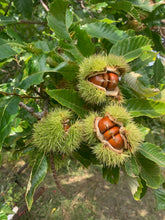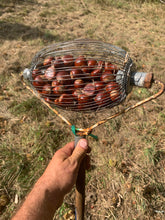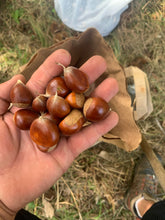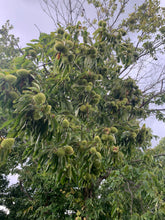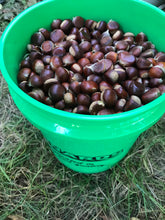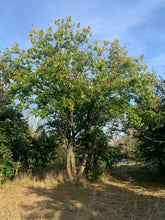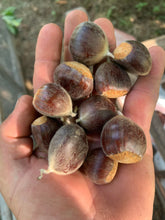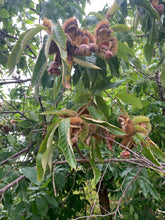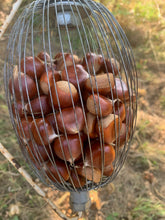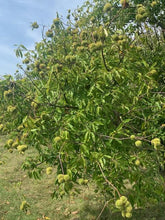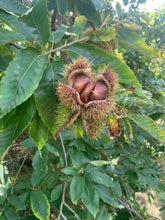Badgersett Chestnut SEEDS (March 2024 Shipping)
Regular price
$25.00
Sale
*****We had intended to begin shipping chestnut seeds on Tuesday, March 19th. However due to the cold temperatures we will be delaying this until it warms up. Thanks for your patience.
IMPORTANT ORDER NOTE: If you order any other seed packets, seed garlic, or anything else on our website in the same order as chestnut seeds, these other items will not ship until we are ready to ship the chestnut seeds all together in the same order! Please place two separate orders if you need any other items shipped immediately.
SHIPPING RESTRICTION NOTICE: By law we are not shipping chestnut seeds to California, Oregon, or Washington. We are also not shipping them internationally.
IMPORTANT SEED STORAGE NOTE: We have been storing these seeds in our fridge at about 35°F since we have had them in our possession going back to October. In March and April we typically observe the seed begin to germinate in the fridge. These seeds have went through the necessary cold stratification and could be ready to begin germinating anytime. So feel free to keep them in the fridge when you get them, or plant them.
Badgersett/EFN Chestnut and Hazelnut Limit Agreement: By purchasing these seeds you are agreeing to the terms and conditions found at this link.
Castanea spp. (complex interspecific hybrids)
Origin: Badgersett Research Farm, Canton, Minnesota
Improvement status: Breeding population (cultivated, semi-domesticated, genetically diverse "hybrid swarm")
Life cycle: Perennial
Pricing options:
10 seeds for $25 ($2.50 each)
25 seeds for $56.25 ($2.25 each)
50 seeds for $100 ($2 each)
100 seeds for $150 ($1.50 each)
200 seeds for $250 ($1.25 each)
300 seeds for $375 ($1.25 each)
400 seeds for $500 ($1.25 each)
500 seeds for $625 ($1.25 each)
We're incredibly excited to be offering Badgersett chestnut seeds here for the first time in nearly a decade. Developed by Philip Rutter of Badgersett Research Farm in Canton, Minnesota, Badgersett hybrid chestnuts comprise a highly genetically diverse, multi-generational, multi-species hybrid swarm of 5 species of chestnut — primarily American chestnut (C. dentata) and Chinese chestnut (C. mollissima), but also including contributions from Japanese (C. crenata) and European chestnuts (C. sativa), and Chinese dwarf chinquapins (C. seguinii) — created with the goal of combining the valuable traits of the various species into high-performing all-purpose trees with exceptional cold-hardiness.
Badgersett has been breeding, testing, and selecting chestnuts at their home farm in southeast Minnesota since the early 1980s, and the seeds we're offering come from selected mother trees that are productive and have good nut qualities, while also having withstood 3-4 decades of severe Minnesota winters (multiple winters with low temps of -35° to -40° F). They also have good to excellent tolerance to chestnut blight.
Most of our seed parents withstood the most recent "test winter" of 2018-2019 — which combined a warm late fall with a rapid shift to deep cold in early November, along with two nights of -40°F in January only days after temperatures in low 40s, followed by continued deep cold in February and March — all with minimal to no damage. Trees have also continued to produce well in this year's exceptional drought — the most severe drought classification used by the UNL National Drought Monitor — although the drought has made many of the nuts smaller than usual (this should not impact the health of your trees or subsequent generations at all).
The diversity of the Badgersett parent trees will manifest itself in a great diversity of chestnut phenotypes among seedlings, with some bearing smaller, sweeter, fuzzier seeds quite similar to the nearly lost American chestnuts, while others will be bigger, starchy, and smooth, like Chinese chestnuts, and still others will be intermediate between those two extremes. The plants themselves have been selected to be relatively compact and productive nut-bearing trees, though some trees that are more of the tall timber type may crop up as well.
All told, these chestnuts come from very impressive trees that have stood the test of time and the elements, including climate, pests and disease. However, like any genetically diverse population, some progeny will be more desirable than others. Some have the potential to be exceptional, no doubt about it. But in an open-pollinated, genetically-diverse orchard like Badgersett's, the nuts from selected trees are pollinated by all of the rest of the trees. This can cut both ways.
As we enter into an uncertain ecological future beset with volatility from climate change and environmental degradation, we believe it is absolutely imperative for the agroforestry practitioners of the world to be trialing trees from genetically diverse populations like Badgersett's. Diversity means resilience. Thank you for doing your part to help our species adapt to the ever-changing world of tomorrow!
Two notes on storing and handling chestnut seed: In order to germinate in the spring, chestnuts need to be kept cool (32-40F) and moist for 2-3 months. The easiest way to do this is to store them in slightly vented plastic bags in the fridge. Do this immediately after receiving your seeds in the mail. You can add slightly moist (not damp!) peat moss to the bag to help retain moisture, if necessary; this is usually helpful for small amounts of seed. Chestnut seed CANNOT FREEZE! They will die if frozen.
Second, chestnuts need to be grown in a rodent-proof situation. This usually means protected by 1/4" hardware cloth, either in a greenhouse or a rodent-proof nursery bed. Do not just plant them directly in the soil without protection, they will almost always be eaten by rodents or birds.












